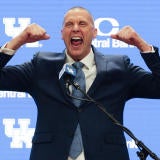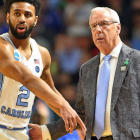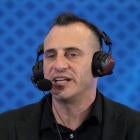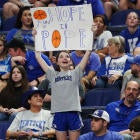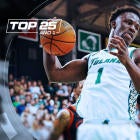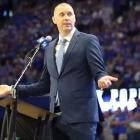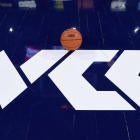GLENDALE, Ariz. -- The innocents await Monday night.
We’re talking about North Carolina’s players who could win a national championship against Gonzaga, then not be able to defend it.
As an epically long and contentious academic fraud investigation/case draws to a close (hopefully) at Carolina, there is a clear and present possibility of major sanctions.
The innocents – the players and coaches who would be affected – would be victims of a situation they have absolutely nothing to do with.
That’s a major flaw with the NCAA enforcement model that has existed since 1952. The organization hasn’t figured out a way to fairly bring down the hammer on a school long after violations may have occurred.
Sometimes the only folks left to punish are the existing coaches and players. That goes against every sense of fairness there is.
“That’s a struggle,” said Gonzaga AD Mike Roth, whose team will face the Tar Heels in Monday night’s championship game. “To punish the student-athletes for something they weren’t involved in, to punish an administration, to punish a coach. I don’t know if there is a perfect solution.
“I wish there was a way to punish people. It’s the downside of our business.”
And it won’t go away.
- Reggie Bush was long gone when the NCAA took away 30 USC scholarships and two bowls in 2010. Bush ran into the NFL after running the Trojans into trouble. His former teammates and program suffered mightily.
- The NCAA initially took away 40 scholarships and hit Penn State with a four-year bowl ban in 2012 in the Sandusky scandal. Some of those penalties were rescinded but the damage was more than done and continues today.
- Twenty-three days after Urban Meyer took the Ohio State job in 2011, the Buckeyes were hit with a bowl ban. An undefeated team in 2012 wasn’t allowed to compete for the Big Ten or BCS titles.
We’re not here to pass judgment on wrongdoing in what some are calling the biggest academic fraud scandal in the NCAA’s history. That subject has been addressed in this space on many occasions.
North Carolina and the NCAA are in the eighth year of what some have called the biggest academic fraud case in history. It’s tiresome. It’s also unfair for the blameless athletes playing for a national championship Monday night.
“Those players, if there was a year they couldn’t play in the NCAA Tournament they couldn’t get that back,” Roth said. “I just don’t know what the solutions are.”
A third notice of allegations in December put basketball and football squarely back in the NCAA’s crosshairs.
It would be a first for men’s basketball if the NCAA took down one or both North Carolina championship banners in 2005 and/or 2009. But even if those titles remain, the ultimate intent of major penalties is to impact a team’s ability to compete.
That could take many forms – scholarships, postseason bans, vacating wins. At the least it’s bad publicity. That wave of bad pub has already hit Roy Williams.
“People have tested my credibility and I haven’t appreciated that,” North Carolina’s coach said. “It’s been used against us in recruiting … I wouldn’t wish that on my worst enemy and I don’t have too many enemies.”
Williams told the story of an undecided recruit whose father said, “We’re just going to wait until the spring. It will be over by then. we’ll know exactly what it was.”
“That,” Williams added, “was two years ago.”
The coach said he landed 26 McDonald’s All-Americans in his first 10 years at North Carolina. In the last three seasons, he has one.
“I don’t think I got dumb that quickly,” Williams said.
In short, it would be nothing short of a shame if returning players from this year’s team wouldn’t get to defend a title won on Monday. That’s where the innocents come in. At least six players – two of them major contributors – figure to return next season.
Forget about defending, will the likes of Joel Berry and Theo Pinson even have an NCAA title to chase in 2018?
“I trusted coach with everything I had,” said Pinson, who honored a commitment he made as a high school junior just as the allegations were starting to hit.
“He told me nothing was going to happen. I didn’t want to go back on my word. This is where I wanted to be.”
The program’s future viability will/should be the No. 1 topic in Chapel Hill the further we get away from Monday night. An end to the case could come – maybe – this year.
It is the stain on everything Carolina that just won’t go away. The school considers itself on some level a public Ivy. From 3,000 miles away, Roth sympathizes. In the latest APR, Gonzaga was tied with Dartmouth with the nation’s No. 1 Division I APR.
“I sure don’t throw rocks at glass houses because I live in one,” Roth said. “I believe it had very little to do with their athletic dept. I think it has to do with maybe one or two individuals.
“That can happen in the business of college athletics. Somebody is doing what they shouldn’t be doing. Sometimes it takes a while for them to get caught.”
Former department manager Debbie Crowder now saying bogus classes in question were, in fact, legitimate certainly complicates matters.
It is “my firm belief that we did nothing wrong, okay?” Williams said. “And that’s just the best way to put it.”
In men’s basketball, the first and perhaps only national champion not able to defend its title was Williams’ first team at Kansas in 1988-89. Larry Brown had left a bit of a compliance mess behind, starting on a hat trick of college programs the hall of fame coach put on probation. (UCLA and SMU were the others.)
This is not necessarily an indictment of what may have gone on at North Carolina. This is an analysis of the future.
The possibility remains of major sanctions against the basketball and football programs. The school may have done itself no favors by questioning the process.
The NCAA has certainly gone all in against North Carolina. It said the alleged wrongdoing “appears to implicate issues at the very core of the Collegiate Model.”
The NCAA added many “at-risk” athletes in football and basketball used the bogus classes to ensure their “continuing NCAA academic eligibility.”
If that sounds bad, it is.
Let’s not forget the NCAA model itself is at stake in this case. Many think if North Carolina goes unpunished or relatively unpunished the question needs to be asked: What’s the use of NCAA enforcement anyway?
If it was only about a national championship basketball game on Monday.
“The people that I know at North Carolina, [AD] Bubba Cunningham and especially Roy and his staff, how close they have become,” Roth concluded. “I can’t believe in my wildest dreams there was any level of knowledge.
“There just can’t be.”








